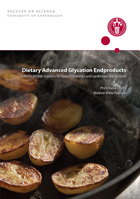PhD defence: Dietary Advanced Glycation Endproducts
Effects on risk markers for type 2 diabetes and cardiovascular disease
Malene Wibe Poulsen
PhD thesis
High heat cooking induced flavor, aroma, and color of food, but also leads to formation of ”Advanced Glycation Endproducts” (AGEs). AGEs are also formed in the body as part of our metabolism.
Formation of AGEs in the body has been linked to the development of diabetic complications. As the contribution of AGEs from food has been estimated to be larger than the amount formed in the body, it has been discussed if AGEs from food can contribute to development of type 2 diabetes and cardiovascular disease.
The overall aim of this thesis was to investigate if intake of AGEs from food increases the risk of developing type 2 diabetes and cardiovascular disease.
2013, 138 pages,
ISBN 978 87 7611 627 9
Time
6 September 2013 at 13:00
Venue
Lecture Hall A2-70.03, Thorvaldsensvej 40, Ground Floor, 1871 Frederiksberg C, Denmark.
Opponents
Professor Per Torp Sangild (Chair), Department of Nutrition, Exercise and Sports, Faculty of Science, University of Copenhagen, Denmark
Professor, Helen Vlassara, Division of Experimantal Diabetes & Aging, Brookdale Department of Geriatrics & Adult Medicine, Mount Sinai School of Medicine, New York NY 10029, USA
Associate Professor Elin Marianne Östman, Department of Food Technology, Engineering and Nutrition, Lund University, Lund, Sweden
Principal supervisor
Associate Professor Susanne Gjedsted Bügel, Department of Nutrition, Exercise and Sports, Faculty of Science, University of Copenhagen, Denmark.
Co-Supervisors
Professor Lars Ove Dragsted, Department of Nutrition, Exercise and Sports, Faculty of Science, University of Copenhagen, Denmark.
Associate Professor Lesli Hingstrup Larsen, Department of Nutrition, Exercise and Sports, Faculty of Science, University of Copenhagen, Denmark.

